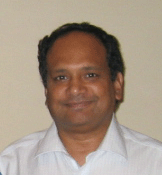
|
Dr. Sunil Chacko Dr. Sunil Chacko is Partner with New Info Solutions LLC, a biotechnology and finance advisory agency he co-founded in 1999 with offices in Washington DC, US, Vancouver, Canada, Tanabe, Japan and Trivandrum, India. Dr. Chacko is Professor of Health Sciences (Adjunct) at Canada's Simon Fraser University, Vancouver, and Professor of Health Sciences (Adjunct) at Indira Gandhi National University, New Delhi. He is the Vice President for North America of the Global India Foundation, and Research Director of the Malony Foundation, Vancouver. He has received a medical degree from Kerala University in India, a master's in public health from Harvard University , and an M.B.A . with concentration on finance from Columbia University, along with training in information technology (IT) and database/software programming. Dr. Chacko holds a current medical license. He has worked as a physician, and was the founding Assistant Director of the Harvard University-based Commission on Health Research for Development that first quantified and documented the severe gap in capacity and financing for health research targeted at neglected diseases after undertaking a worldwide study. That co-authored study (1987-1990) Health Research: Essential Link to Equity in Development published by Oxford University Press in 1990 and released at the Nobel Conference on Health Research, became the basis of the work in global health of major US foundations and multilateral agencies, especially the Bill and Melinda Gates Foundation. He authored one of the earliest papers linking the spread of HIV/AIDS to the poverty, destabilization and instability in Sub-Saharan Africa: "Sexual Behavior, AIDS and Poverty in Sub Saharan Africa" published by the International Journal of STD and AIDS, January 1991. Dr. Chacko initiated, facilitated and organized the world's first debt-for-health research swap. It was for $1 million for developing countries in 1990. He directed the debt-for-development swaps project at Harvard University. He was closely involved in the reformulation of the Rockefeller Foundation's health sciences strategy to focus on new product development against neglected diseases that is in place today, and was a key expert in the creation of several product development public-private partnerships that were financed by major foundations and international agencies. Among those, he developed the organizational framework for a new financing entity in new antibiotics research, especially focused on reducing the length of time and enhancing the effectiveness of treatment against Tuberculosis that each year causes 2 .4 million deaths worldwide. In 1993, just as the Internet browser was developed, he initiated & advocated for, and was a member of the core team that built the first Internet-based service of the World Bank Group. It was on foreign direct investment. He thereafter became Advisor and Special Assistant to the Executive Vice President of the World Bank Group. He has also served as a Consultant/Advisor for the United Nations Development Program (U.N.D.P.), the United Nations Children's Fund (U.N.I.C.E.F.), the World Health Organization ( W.H.O.), and major U.S. foundations. For the U.N.'s International Conference on Financing 2002 attended by most heads of state and government, his chapter "Developments in Private Sector Knowledge-based Entrepreneurship in the South" was published by the U.N.D.P. in the official documentation for the conference. It included analysis of computer and Internet technologies to accelerate world-wide health R&D. He cooperated with some of the top venture capitalists in the world on extending micro-venture capital financing to developing countries as a new source of development finance. He was an invited participant at the U.S. Congress General Accountability Office's (GAO) briefing for U.S. Senators, U.S . Representatives, and Congressional staff in August 1999, and the U.S. Presidential Conference on vaccine research against neglected diseases held at the U.S. National Institutes of Health (N.I.H.), July 2000. He was appointed the Rapporteur for the U.S. National Institutes of Health Meeting on Nevirapine, international debt, and financing constraints, December 1999, held at the N.I.H. He co-organized, along with the Robert Wood Johnson Foundation and the Rockefeller Foundation, the Conference on Public Health Surveillance against emerging infectious diseases 1998. That work appears prescient in view of the risks of an avian flu pandemic. He undertook a review of the health sciences and the new medicines and generics pharmaceutical industry of North America, Europe, Japan, India, Brazil, South Africa, undertook equity analysis for valuing new economy companies, as well as the implicit equity participation of public entities such as foundations in joint ventures with the private sector. He currently conducts science, technology, finance and equity analysis on the medical, digitalgenomics, pharmaceutical and biotechnology sectors and has been advising on the new sciences industry, pharma & biotech, imaging, IT-enabled care including telemedicine and on incentives to encourage partnerships between academia, government research institutions and industry on harnessing the new sciences for product development of new medicines, vaccines and diagnostics. He
has published opinion-editorials in the Huffington Post, the
Washington Times and the Business Standard, Indian affiliate
of the UK's Financial Times, and wrote three large volumes
of insight, analysis and recommendations to the Rockefeller
Foundation's senior management: Health Biotechnology, Tuberculosis
and Opportunities in the South (May 1999), Harnessing New
Sciences for Neglected Diseases through Partnerships (Nov.
1999), Looking to the Future: Partnerships for Neglected Diseases
R&D (June 2000). [Home] [Executive Council] [Associates] [Fellows] [Staff] |
|
|
Copyright:
Global India Foundation, 2011 Best view @ 1024 by 768 Screen Resolutions |
||
